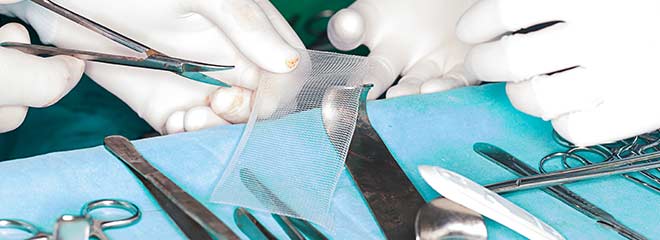
If you or a loved one has suffered scarring, perforated internal organs, infection or other serious injury as a result of the Bard Avaulta Mesh, you may be entitled to compensation. We are presently working with some very experienced Bard Mesh lawyers, who can file a lawsuit on your behalf, and charge no fee until you receive an award or settlement. Feel free to contact us toll free anytime or visit us online for a free consultation.
Have You Suffered Serious Complications From an Implanted
Bard Avaulta Mesh Device?
Call Us Now For a Free Case Evaluation!
About This Device and its Manufacturer
C.R. Bard develops and manufactures medical devices in the areas of vascular, urology, and oncology. Between the company’s six divisions, it has developed more than 8,000 products. C.R. Bard products have earned about $2.7 billion dollars in revenue annually over the last several years. In September 2008, the Bard Avaulta mesh patch gained Food and Drug Administration (FDA) approval.
Device Side Effects
 This device has been linked to serious side effects including erosion of the mesh patch, perforation, return of pelvic organ prolapse (pelvis bone slips out of place) and infection, etc. Several Bard Mesh Lawsuits have filed alleging that the Bard mesh patch was defectively designed and not properly tested before entry into the market. Possible side effects/injuries Include:
This device has been linked to serious side effects including erosion of the mesh patch, perforation, return of pelvic organ prolapse (pelvis bone slips out of place) and infection, etc. Several Bard Mesh Lawsuits have filed alleging that the Bard mesh patch was defectively designed and not properly tested before entry into the market. Possible side effects/injuries Include:
- Erosion of the mesh through the vaginal tissue
- Vaginal pain and bleeding
- Vaginal scarring and shortening
- Vaginal infection (drainage)
- Problems urinating
- Pain during sexual intercourse
- Perforation of the bladder, intestines,
and bowels - Recurrent Pelvic Organ Prolapse (POP)
- Recurrent Stress Urinary Incontinence (SUI)
Many, if not most, patients who have had complications resulting from the mesh required additional medical care or operations, including: IV therapy, blood transfusions, drainage of abscesses, and surgery to repair or remove the defective mesh.
Stress Urinary Incontinence and Pelvic Organ Prolapse in Detail:
 What is Stress Urinary Incontinence?
What is Stress Urinary Incontinence?
Stress urinary incontinence (SUI) is the involuntary loss of urine, usually occurring during physical activity such as coughing, sneezing, laughing, standing up, sexual intercourse, or exercise. SUI may be caused by weakened pelvic muscles, or because the urethral sphincter is not working correctly. This problem is most often associated with:
- Injury to the urethra area
- Surgery in the pelvic area
- Childbirth (most common)
SUI is the most common form of urinary incontinence in women, often seen in women who have had more than one pregnancy involving vaginal delivery.
What is Pelvic Organ Prolapse?
Pelvic organs may slip out of place (prolapse) when the muscles and ligaments supporting a woman’s pelvic organs weaken. This often will require surgical repair. Organs associated with pelvic prolapse include:
- Uterus
- Urethra
- Bladder
- Vagina
- Small Bowel
- Rectum
POP is primarily caused by the strain/stress of giving birth. Pelvic organs normally are kept in place by the muscles and tissues in the lower abdomen. During childbirth, however, these muscles may stretch or weaken. If they do not recover afterward, they are unable to support the pelvic organs. Some symptoms of this condition include:
- Feeling pressure from pelvic organs pressing against the vaginal wall
- Feeling very full in the lower belly
- Pain during sexual intercourse
- Constipation
If you have experienced any of the above symptoms as the result of Bard Avaulta Mesh, you may have a claim against the device’s manufacturer, C.R. Bard.
Related Medical Studies
 According to an August 2010 article published by The American College of Obstetricians and Gynecologists, scientists had to stop a transvaginal mesh clinical test before its completion because the female participants were experiencing too many complications from the device. The test began in 2007 when 65 women with POP either underwent a transvaginal mesh surgery or a colpopexy (surgical procedure to reposition a woman’s vagina). The test was stopped in 2009 after 15% of the women implanted with the mesh device faced a complication linked to a split of the skin and protrusion of the mesh therefrom. These adverse effects occurred within the immediately following three months due to erosion of the mesh. Scientists stated: “This study questions the value of additive synthetic polypropylene mesh for vaginal prolapse repairs.”
According to an August 2010 article published by The American College of Obstetricians and Gynecologists, scientists had to stop a transvaginal mesh clinical test before its completion because the female participants were experiencing too many complications from the device. The test began in 2007 when 65 women with POP either underwent a transvaginal mesh surgery or a colpopexy (surgical procedure to reposition a woman’s vagina). The test was stopped in 2009 after 15% of the women implanted with the mesh device faced a complication linked to a split of the skin and protrusion of the mesh therefrom. These adverse effects occurred within the immediately following three months due to erosion of the mesh. Scientists stated: “This study questions the value of additive synthetic polypropylene mesh for vaginal prolapse repairs.”
Later in 2010, the medical journal, Female Pelvic Medicine & Reconstructive Surgery, published a study titled “Factors Associated with Erosion of Transvaginally Placed Polypropylene Mesh for Pelvic Organ Prolapse.” In this study, researchers found no link between the erosion of transvaginal mesh and factors such as smoking, age, menopause, hormone replacement therapy, diabetes, or body-mass index. This study supports the argument that transvaginal mesh products such as Bard Avaulta Mesh Patches are defectively designed, and the erosion of the device is a direct result of that defective design, not due to intervening factors.
In 2011, Journal of Obstetrics and Gynecology Canada, published a study indicating that transvaginal mesh devices were still in a developmental stage. Specifically, the study stated: “Until adequate effectiveness and safety evidence is available, the use of new transvaginal mesh devices for prolapse repair should be considered experimental and restricted to use in investigative trials.”
According to a 2012 study presented to the International Continence Society, even successful transvaginal mesh revision surgeries have less than ideal results for patients. The study reviewed 47 cases where transvaginal mesh required revision surgery. While 72% of the surgeries were deemed successful, patients were still much worse off than they had been prior to their original transvaginal mesh surgery.
FDA Transvaginal Mesh Warnings
The Bard Avaulta Mesh Patch is part of a class of transvaginal mesh medical devices that has caused the FDA to issue serous warnings. On October 28, 2008, the FDA issued its first warning regarding transvaginal mesh devices. Specifically, the warning stated that Pelvic Organ Prolapse (POP) and Stress Urinary Incontinence (SUI) patients implanted with these devices could suffer serious side effects. Since 2008, the FDA has received 180 adverse event reports regarding the device and thousands of reports about similar transvaginal mesh products. More recently, an FDA panel designated transvaginal mesh products as “high risk.”
C.R. Bard-Manufactured Product Recalls
In recent years, C.R. Bard has had to recall a number of its dangerous medical devices. For example, in 2005, 2006, and 2007, the FDA issued recalls of the company’s Bard Composix Kugel Mesh. Most recently, the FDA issued a recall of C.R. Bard’s XenMatrix Surgical Graft. In July 2012, the company stopped marketing Bard Avaulta products in the United States after the FDA required transvaginal mesh manufacturers to perform additional testing on the products. Bard Mesh products have not been formally recalled, but production was halted by the manufacturer in January 2012 because the device caused so many injuries to the patients in whom it was implanted.
Elements of a Dangerous Medical Device Claim:
In order to have your injuries compensated for by the manufacturer, you must prove either: that you did not receive adequate warnings, the device was defective in the condition it was put on the market in, or that the device as it was used on/in you was in some way defective. The next thing that you have to prove is that the device caused the side effect or disease that you were diagnosed with.
To prove this, people need many different experts and medical opinions. Experts are brought in to prove that the device is in fact defective. These lawsuits are very time-consuming and detail-oriented, but if your claim is valid, you deserve compensation for your injuries.
Types of Damages that May Be Recoverable:
- Medical Expenses
- Emotional Distress
- Lost Wages
- Loss of Quality of Life
- Pain and Suffering
- Spousal Loss of Consortium
- Loss of Ability to have Sexual Intercourse
Bard Mesh Lawsuits
 Individuals bringing these lawsuits are alleging that the Bard Avaulta products were defectively designed and the company failed to provide reasonable warnings. Many plaintiffs allege that the defective design caused the device to erode and become infected. These side effects required patients to undergo additional corrective surgery. Recent complaints by women from Kentucky, Tennessee, and other states have alleged that the erosion of the mesh caused it to move from its original position. This migration of the mesh can cut through tissue and damages organs causing permanent injury. Most recently, a woman in her early 50’s filed a lawsuit against C.R. Bard claiming her problems stemmed from their product which had been used to treat her occasional urinary incontinence. Complications resulting from use of the device eventually led the woman to needing eight additional surgeries and other corrective procedures.
Individuals bringing these lawsuits are alleging that the Bard Avaulta products were defectively designed and the company failed to provide reasonable warnings. Many plaintiffs allege that the defective design caused the device to erode and become infected. These side effects required patients to undergo additional corrective surgery. Recent complaints by women from Kentucky, Tennessee, and other states have alleged that the erosion of the mesh caused it to move from its original position. This migration of the mesh can cut through tissue and damages organs causing permanent injury. Most recently, a woman in her early 50’s filed a lawsuit against C.R. Bard claiming her problems stemmed from their product which had been used to treat her occasional urinary incontinence. Complications resulting from use of the device eventually led the woman to needing eight additional surgeries and other corrective procedures.
Attorneys all over the country are now filing lawsuits on behalf of similarly situated women…
Please Speak With Your Doctor Before Making Any Medical Decisions Regarding The Bard Avaulta Mesh Patch.
Contact the Law Offices of d’Oliveira & Associates
 If you believe that you or a loved one has been injured by this device, speak with a personal injury attorney about your potential claim. d’Oliveira & Associates is working with qualified, professional dangerous medical device lawyers across the nation who handle these types of cases.
If you believe that you or a loved one has been injured by this device, speak with a personal injury attorney about your potential claim. d’Oliveira & Associates is working with qualified, professional dangerous medical device lawyers across the nation who handle these types of cases.
Call d’Oliveira & Associates at 1-800-992-6878 or fill out a contact form for a free legal consultation.
